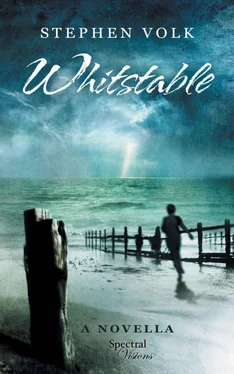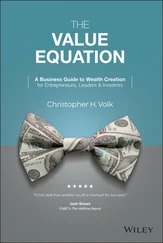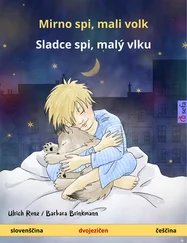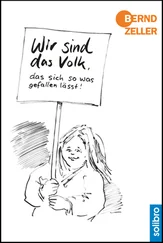After stuffing the brown paper bag deeper into the bin he turned back, and to his sudden alarm saw the boy walking briskly away.
“Wait.”
But the boy did not wait.
Where were the parents? Where were the dashed parents and why were they not—? …but all Cushing’s thoughts and recriminations hung in the air, incomplete and impotent. He had denied the boy the help he had craved—however fantastical, however heartfelt, however absurd—and now the lad was gone.
“Wait…”
Cushing sat back down, alone, and saw that the book from under the boy’s arm was still sitting there.
* * *
Movie Monsters by Denis Gifford.
He placed it with its cellophane-wrapped cover on the desk of the public library. They knew him well there. They knew him well everywhere, sadly, and he intuited as he approached that there was an unspoken choreography between the two female assistants, vying for who would serve him and who would be too busy. It was not callousness that made them do so, he knew—merely the all-too-British caution that a wrongly-placed word might cause unnecessary hurt. Did they realise their shared eye contact alone caused hurt anyway? He forced a benign smile.
“Good afternoon.”
“Good afternoon, Mr Cushing.” The younger one drew the short straw. He was still unshaven, had been for days and he wondered if he looked rather tramp-like. Little he could do about it now.
“I’m terribly sorry to trouble you, my dear, but I wonder if you might help me? I found this library book near Sea Wall today and I wonder if you’d be so kind as to tell me the name and address of the person it belongs to. They must be dreadfully worried about losing it. I’d be most awfully grateful.”
“By all means. Just a moment, sir…” She checked the date stamped inside the cover and turned to consult the chronologically-arranged index of book cards behind her. Her rather thick dark hair fell long and straight across her shoulder blades. She wore a tight green cardigan and high heels that made her calves look chunky from behind, and he pondered whether she was happily married and, if so, for how long. With how many years ahead of her? “That’s fine, Mr Cushing. We’ll make sure he knows his book has been returned.”
“No, you see—bless you—it’s no trouble for me to return it to him personally. I really am quite grateful for the distraction.”
A flicker in her eyes. “Oh. I understand. Of course. In that case…” She coughed into her hand and looked at the details a second time. “The name is Carl Drinkwater.” She read out in full an address in Rayham Road. “That’s one of the new houses over on the other side of the Thanet Way, off South Street. Do you know it?”
“Not at all.”
She opened a drawer and produced a small map of the town, unfolded it and marked the street with a circle in red Biro as the black one was empty.
“Splendid. Thank you so much.” He took her hand and kissed it, as was his habit (“immaculate manners; such a gentleman”) before walking to the exit.
“Mr Cushing?” He turned. “Mrs Cushing, sir. I’m so very sorry. She was such a delightful woman.”
He nodded. “Thank you so much.”
He was astonished to hear the four words come from his throat, because the fifth would have stuck there and choked him. He hoped the woman was married and happy, with children and more happiness ahead of her. He truly did.
* * *
He returned home to fetch his bicycle, the Jaguar of more joyful days secreted in the garage these many months: memories preserved in aspic, too painful to be given the light of day. He swapped his woollen fisherman’s hat for a flat cap, grabbed a heavier scarf, and, with the library book in his pannier, rode via Belmont Road and Millstrood Road to the boy’s house—what appeared to be a two-bedroom bungalow on the far side of the railway track.
The February sun was low by now and the sky scrubbed with tinges of purple and ochre. He chained his cycle to a lamp post opposite and stayed in the protective shadow between an overgrown hedge and a parked white van ( For All Your Building Needs ) as he scrutinized the place from afar.
The garage had a green up-and-over door with a dustbin in front of it on the drive. The lawn grass was thin and yellowing. He could see no garden ornaments and the flatness of the red brick frontage was broken only by a plastic wheel holding a hosepipe fastened to the wall. Two windows matched, a third didn’t and the door, frosted glass and flimsy, was off-centre.
He looked at his watch—Helen’s ring tinkled against the glass face—and placed it back in his pocket. He blew into his hands, preparing himself for a long wait, hoping he had enough cigarettes left in his packet and, no doubt because of the worry this engendered, lit one, no doubt the first of many. He might of course smoke the lot and find this turned out to be a fruitless enterprise. There was no guarantee the man went out on a Saturday night, though a lot of men normally did. He was not dealing with, perhaps, the most normal of men.
After fifteen minutes or so a dog-walker in a quilted “shortie” jacket passed and Cushing pretended he was mending a puncture with his bicycle pump, never more conscious that his acting had to be as naturalistic as possible. Believability was all. The Labrador sniffed his tyres but the dog-walker, who resembled the sports commentator Frank Bough, yanked the lead and progressed on his way with only the most cursory of nods.
Cushing fixed his bicycle pump back into place and looked over at the house.
Hello. The light was on in the hall now, beyond the frosted glass. Shapes were donning coats. The door opened. He ducked down behind the white van, craning round it to watch a man in a donkey jacket tossing his car keys from hand to hand, a few steps behind him a boy in a football strip following him to a parked Ford Zephyr. Reflections in the windscreen stopped him from getting a good look at the man’s face.
Cushing quickly hid in case Carl, whose eyes were on the road ahead, saw him. He listened for the engine to start and waited for it to sufficiently fade away.
As soon as it had, he crossed the road and knocked on the front door. He could hear the television on inside, so rapped again slightly harder. “All right, all right, keep your hair on…” A woman approached the glass and he could already make out she wore a red and white striped top, a big buckle on a wide belt and bell-bottomed jeans.
The door opened to reveal someone who, he imagined, thought herself attractive and feminine but who seemed to have endeavoured to make herself anything but. Her hair was drastically pulled back from her forehead in a pony tail, her clothes did nothing to enhance her figure, and there was nothing graceful or pretty in her demeanour or stance. He thought of the quiet perfection of Helen by comparison and had to quickly dismiss it from his mind. He reminded himself of his abiding belief that all women should be respected and accorded good manners at all times.
He took off his flat cap. “Mrs Drinkwater?”
“Yeah.”
“You don’t know me…”
“Yeah, I do.”
His eyebrows lifted. “Oh?” Was she a fan of Hammer films, then, like her son?
“Of course I do. I’ve seen you on the telly.”
Fool. He’d been the BBC’s Sherlock Holmes over a number of televised adventures alongside Nigel Stock as Dr Watson. Naturally she recognised him. His portrayal of the great detective, after all, had been widely acclaimed.
“Morecambe and Wise,” the woman said.
Oh dear, he thought. How the mighty are fallen. Serve him right. The Greeks had a word for it: hubris . The sin of pride.
“You live round here,” she said.
Читать дальше












